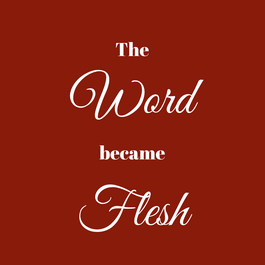 One of the reasons that many people want to create worship experiences without preaching is because we live in a society "dominated by words." That concept first appeared to me in Jonny Baker's Curating Worship, a book that argues we should design worship events to include many more modes of engagement that preaching, speaking, song, and the limited amount of visual art and nonverbal music that appear in many churches. Baker's not wrong that words have taken an overwhelming precedence in our society. Jay Gamelin, a Lutheran pastor and speaker, talks about how the modern world, up to the verge of the 21st century, was a "tell me" culture. Education, knowledge, even belief itself were supposedly founded upon what we were told. However, as Jay points out, we've turned toward a "show me" culture, where people have become less bound to words and more enchanted by images. The rise of picture- and video-based social media offer a small example. That Facebook, where people go into multi-paragraph diatribes, is losing ground to Twitter, where your commentary is limited to 140 characters, and Instagram, based entirely upon photographic media. Of course, that's why Facebook bought Instagram, to ensure a stake in the next evolution of social technology. With this all being true, it's even more understandable why people seek to suppress preaching. We're weary of words. We're also likely weary of words because words have been so often used to hurt, especially words from self-identified Christians. Sometimes they're painful because of the hate couched in religiosity, like we see from Westboro Baptist. At other times they're hurtful because they're false promises, like we find in the Prosperity Gospel. Perhaps most often, though, it's the ugliness of sin that we see in even the best of of Christians. Our hypocritical behavior might be magnified by stories like The Handmaid's Tale, but the presence of sin covered in Christian frosting is no less insidious for us and the culture around us. So why preach, even still? We use our words to talk about our God because our God is a word, and in fact, The Word, that created all good that exists. Our words are limited and often feeble when compared to God's unlimited goodness, but through our words, we connect to God's Word. Of course, words aren't the only way we connect to God's Word, but they're a unique way that we connect with God. Many creatures (rocks, soybeans, water) have no language at all, while other creatures communicate within their species to a certain extent, though in typically less complicated version than humans. Words, it seems, are connected with the evolutionary progress of our brains as a species, which means we've a capacity to engage with God that likely no other creature does. We should use that capacity, and preaching is a formative way the church has done that in the past.  Words used well are the heartbeat of God's love in our lives. Of course, just because we used to do it doesn't mean that we still should. That's where we ought to take seriously the arguments of those like Jonny Baker. The barrage of verbiage we face in worship likely hits the ear of a postmodern 23 year old quite differently than it did of someone the same age in 1617. Our attention spans are shorter today than ever before and yet we're more captivated than ever with images on screens: in our houses, on our desks, in our pockets, and on our wrists. If we want to communicate the person and presence of God to our culture, we must communicate in ways that make sense. Fewer words and more paintings, more videos, more dance, more theater, more sensory stations, seems to introduce the possibility of more people engaging with God more deeply. That's a good thing. But neither should we throw out words entirely. There will forever be nerds (like me, admittedly) who find sermons and prayers, as well as the sung and spoken portions of liturgy, compelling. More importantly, though, we must remember that our God is a God that speaks creation into being. There's a performative power with God's words, words that do what they say. If we ignore words in our worship, we're likely to forget the power of words in our lives. That heartbeat of love that we discover in God's Word brings inspiration for new life. That pulsating reminder that, even when we're alone, we have our words, tells us that we're never alone. The Word who gives us words is with us. We should continue to preach in the "show me" culture, but we shouldn't just preach. That's the wonder of John 1:14; "The Word became flesh...". God's Word did something more than speak. God's Word came into being in history. God's Word acted to bring health to the ill, homes to the homeless, full bellies to those who hungered, forgiveness to the sinners, community to the outcasts, reconciliation to the divided. God's Word never stopped at speaking. So we ought to continue to preach as a church. This is most certainly true. But we ought to take much more seriously what comes next. If faith without works is dead, then preaching without activity is pointless. The Word of God acted on our behalf, literally enfleshed the fullness of God's sermon into the life of creation. That's the paradigm in which we preach as Christian proclaimers. Anything less doesn't belong in worship.
35 Comments
9/5/2022 06:03:57 am
Really informative article, I had the opportunity to learn a lot, thank you. https://freecodezilla.net/blog2social-premium-free-download/
Reply
9/5/2022 06:03:58 am
Really informative article, I had the opportunity to learn a lot, thank you. https://freecodezilla.net/active-ecommerce-cms-2/
Reply
9/5/2022 06:03:58 am
Really informative article, I had the opportunity to learn a lot, thank you. https://freecodezilla.net/smartmag-news-magazine-wordpress-theme/
Reply
9/5/2022 06:03:58 am
Really informative article, I had the opportunity to learn a lot, thank you. https://freecodezilla.net/download-free-divi-wordpress-theme/
Reply
9/5/2022 06:03:58 am
Really informative article, I had the opportunity to learn a lot, thank you. https://freecodezilla.net/smart-school-management-system-nulled/
Reply
9/11/2022 05:14:49 pm
Really informative article, I had the opportunity to learn a lot, thank you. https://kurma.website/
Reply
9/12/2022 03:20:22 am
Really informative article, I had the opportunity to learn a lot, thank you. https://odemebozdurma.com/
Reply
9/30/2022 10:42:02 am
It's great to have this type of content. Good luck with your spirit. Thank you. https://bit.ly/site-kurma
Reply
10/4/2022 06:22:38 pm
I think this post is useful for people. It has been very useful for me. Looking forward to the next one, thank you. https://escortnova.com/escort-ilanlari/nevsehir-escort/acigol-escort/
Reply
10/5/2022 05:05:24 am
It was a post that I found very successful. Good luck to you. https://escortnova.com/escort-ilanlari/izmir-escort/beydag-escort/
Reply
10/6/2022 02:17:59 am
I follow your posts closely. I can find it thanks to your reliable share. Thank you. https://escortnova.com/escort-ilanlari/kahramanmaras-escort/caglayancerit-escort/
Reply
10/6/2022 01:53:04 pm
I support your continuation of your posts. I will be happy as new posts come. Thank you. https://escortnova.com/escort-ilanlari/agri-escort/diyadin-escort/
Reply
10/7/2022 05:32:37 am
I think the content is at a successful level. It adds enough information. Thank you. https://escortnova.com/escort-ilanlari/kutahya-escort/cavdarhisar-escort/
Reply
10/8/2022 08:49:26 am
Thoughtful and real content is shared. Thank you for these shares. https://escortnova.com/escort-ilanlari/trabzon-escort/koprubasi-escort-trabzon-escort/
Reply
11/21/2022 04:15:04 am
Tıkla evde calismaya basla: https://sites.google.com/view/evden-ek-is/
Reply
12/9/2022 04:40:55 am
kaliteli düşmeyen takipçi satın al: https://takipcialdim.com/
Reply
12/9/2022 04:41:29 am
Garantili Tiktok takipçi satın al: https://takipcialdim.com/tiktok-takipci-satin-al/
Reply
12/15/2022 04:19:39 am
takipci satın almak için tıkla: https://takipcim.com.tr/
Reply
4/27/2023 04:10:46 pm
Steroid Sipariş: https://www.anabolickapinda14.com/urun/
Reply
8/9/2023 05:49:25 am
Steroid Siparis Steroid Fiyatlari Steroidler Anabolizan Orjinal Steroid Steroid Satis Steroid Satın Al Steroid Siparis Et
Reply
Leave a Reply. |
AuthorSimultaneously a sinner and a saint. Archives
September 2020
Categories |
 RSS Feed
RSS Feed